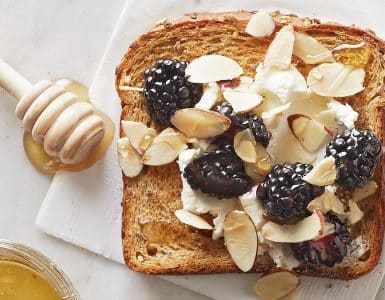So you’ve made the choice–perhaps for health-related reasons, perhaps due to your personal beliefs–to go vegan. But when common sources of protein, such as poultry, meat and eggs, are off-limits, where do you turn to ensure that you’re getting enough protein in your diet? (An adult male should get 56 grams of protein in his diet daily, while an adult female should be getting 46 grams in her diet each day.) Check out this list of protein sources that are acceptable on a vegan diet. Note that this list doesn’t include all vegan-appropriate protein sources—but it does list many of the largest sources of protein that vegans can have.
- Get nutty. Nuts make good snacks and salad toppings, and nut butters are healthy and tasty on a variety of healthy foods, like whole wheat toast or celery sticks. 2 tablespoons of peanut butter have 8 grams of protein. 2 tablespoons of almonds have 8 grams of protein, while 2 tablespoons of almond butter contains 5 grams of protein. A 1/4 cup of cashews has 2.7 grams of protein.
- Eat your veggies. No wonder Popeye liked spinach so much–a cup of cooked spinach has 5 grams of protein. A cup of cooked broccoli contains 4 grams of protein, and a cup of cooked peas has 9 grams. A veggie burger has 13 grams of protein, and a veggie dog has 8 grams.
- Beans, beans, they’re good for your…protein. Many beans and legumes are incredibly high in protein, with lentils emerging as the winner–1 cup of cooked lentils contains a whopping 18 grams of protein. A cup of kidney beans contains 13 grams of protein, a cup of cooked chickpeas or pinto beans has 12, and a cup of cooked lima beans has 10 grams.
- Good-for-you grains. Oatmeal makes for a hearty vegan breakfast–plus a cup of it contains 6 grams of protein. A cup of cooked quinoa contains 9 grams, and a cup of cooked brown rice contains 5 grams of protein. A cup of cooked bulgur–a wheat product–has 6 grams.
- The joys of soy. A 4-ounce serving of firm tofu contains 11 grams of protein. 6 ounces of soy yogurt contains 6 grams, a cup of soymilk has 7 grams, and a cup of cooked soybeans has 29 grams of protein.
- Don’t forget the carbs. A bagel has 9 grams of protein, a 1-cup serving of spaghetti has 8 grams, and two slices of whole wheat breads have 5 grams of protein.
This list gives you plenty of tasty, healthy, protein-packed options. By eating a variety of these foods each day, you can maintain your vegan diet and also reach your recommended daily protein intake. Most of these foods can be found in your grocery store, but you may be able to find a larger selection of foods like soy yogurt, tofu, bulgur, and other less-common protein sources at specialty stores like Whole Foods. As always, if you have questions about nutrition, they’re best directed to your doctor or nutritionist. Don’t currently have a doctor or nutritionist? A health advocacy service can help (you may even have access to one through your employee benefits at work)–they can connect you to medical providers who meet your needs, are local to you, and who are in-network in your insurance plan.



